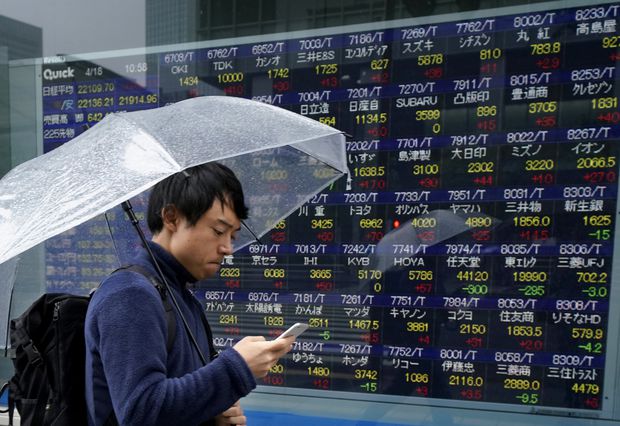Asian stocks choppy, sentiment shaken by sliding yuan

TOKYO (Reuters) - Most Asian stock markets retreated on Friday after China allowed its yuan currency to slide further, stoking concerns Beijing’s currency management could become the next flash point in a fierce trade conflict with the United States.
MSCI’s broadest index of Asia-Pacific shares outside Japan .MIAPJ0000PUS was unsteady in early trading, giving back morning gains to decline as much 0.1 percent at one point. It was last up 0.08 percent.
South Korea's KOSPI dropped 0.1 percent and Japan's Nikkei lost 0.55 percent. Hong Kong's Hang Seng slipped 0.5 percent and the Shanghai Composite Index was down 0.15 percent.
Equity markets in the region were hit after China’s central bank lowered its midpoint for the yuan for the seventh straight trading day and to its lowest in a year.
With China showing little signs of arresting its currency's depreciation, the yuan promptly retreated to a near 13-month low .
“There are several channels through which the yuan’s weakening is hitting Asian stocks. First, a weaker yuan challenges the competitiveness of other Asian economies,” said Shusuke Yamada, currency and equity strategist at Bank of America Merrill Lynch in Tokyo.
“The weaker currency also causes fears of capital leaving China and disrupting their capital markets, which could have knock-on effects on Asia. Lastly, a weaker yuan deepens trade war concerns.”
Asian stock markets were already edgy after Wall Street shares declined overnight amid the latest flare up in trade tensions, with the Dow shedding 0.53 percent and the S&P 500 declining 0.39 percent.
Officials from the EU Trade Commission, due to arrive in Washington next week for trade talks, are said to be preparing a list of tit-for-tat actions in response to proposed US tariffs on EU cars.
In currencies, the dollar was on the defensive following US President Donald Trump’s criticism of Federal Reserve policy.
Earlier,Trump criticized Fed policy and expressed concern about the potential impact of rising rates and a stronger dollar on the US economy and American corporate competitiveness.
The dollar index against a basket of six major currencies stood little changed at 95.178 .DXY after being knocked down from 95.652, its highest level since July 2017.
The dollar had reached that high after Federal Reserve Chairman Jerome Powell expressed confidence in the US economy and affirmed expectations that the central bank was on track to keep hiking interest rates gradually.
The euro was flat at $1.1643 , lifted from a three-week trough of $1.1575 set overnight. The single currency has lost about 0.2 percent this week.
The greenback was unchanged at 112.46 yen .It has been knocked away from one-year peak of 113.18 scaled .It was still up 1.7 percent on the week, boosted earlier after Fed's Powell reinforced expectations for gradual, steady rate increases.
Brent crude futures LCOc1 inched down 0.03 percent to $72.56 a barrel, giving up its earlier gains amid the risk aversion in the broader markets.







